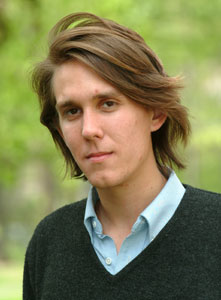BROOK HENKEL '05 USES FULBRIGHT GRANT TO TEACH IN GERMANY

Details
“I've always been interested in the pedagogical problems of teaching foreign languages at a high school level,” says Brook Henkel '05. He admires the European system of teaching English, as well as other languages, to students beginning at a very young age.
As recipient of a Fulbright grant, Henkel will have a chance to further explore Europe's methods of language instruction. He'll spend the 2005-2006 academic year in Hamburg, Germany, working as a foreign language teaching assistant at a college preparatory school. The assignment is being facilitated through Pädagogischer Austauschdienst (PAD, translated as“Pedagogical Exchange Service”), an organization that places teachers at secondary schools throughout Germany. Paired with a German instructor in an English language class, Henkel will help plan lessons, lead discussions, and organize speaking activities among small groups of students.
A resident of Lancaster, Pa., Henkel left high school with a rudimentary understanding of German vocabulary and grammar.“When I got to Haverford, I started from the ground up,” he says. Originally intending to study physics or astronomy alone, he was influenced by his coursework with Associate Professor of German Ulrich Schönherr:“His approach to teaching and languages is incredible.” Henkel changed his majors to German and astronomy, with a particular interest in German literature, and recently completed his senior thesis (with Schönherr as his advisor) on contemporary German author W.G. Sebald and his collection of stories, The Emigrants.
“As a double major in German and astronomy, Brook certainly embodies all the characteristics of an ideal Haverford student whose intellectual curiosity goes further than one particular division or discipline,” says Schönherr.“Of the many undergraduate students I have gotten to know over the last 10 years, he is probably the most self-directed, self-motivated, and original student I have had the pleasure of working with.”
While in Hamburg next year, Henkel plans to continue his studies in German literature by auditing some university classes. He became familiar with the country's higher education system, which allows anyone of any age to sit in on courses, while studying in the city of Freiburg during the second semester of his junior year.
Upon returning to the United States, Henkel may apply to graduate school, but he eventually hopes to apply his experiences as a teacher to the American system of foreign language education.“So many languages, such as Spanish, should be required from kindergarten on up,” he says.“You can deconstruct nationalism and inherent racism by going through the process of learning another language.”
Sponsored by the United States Department of State, Bureau of Educational and Cultural Affairs, the Fulbright Scholar Program sends 800 U.S. faculty and professionals abroad each year to lecture and conduct research in a variety of fields.



